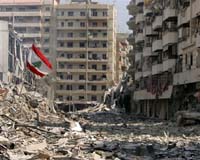| . |  |
. |
Washington (AFP) Sept 1, 2010 Israeli Prime Minister Benjamin Netanyahu vowed to forge a "historic" peace with the Palestinians Wednesday, injecting cautious hope into US President Barack Obama's long-odds Middle East talks. Palestinian president Mahmud Abbas met hawkish Netanyahu's conciliatory rhetoric by calling for an end to bloodshed after the latest Hamas attack in the West Bank, but also demanded a halt to Israel settlement activity. On a day of dramatic White House diplomacy, Abbas and Netanyahu exchanged smiles and shook hands before the cameras, in imagery the White House hopes will dispel mutual suspicion and deep skepticism over Obama's initiative. But the tough talking begins on Thursday, when the pair meet at the State Department and begin the first direct Israeli-Palestinian talks for 20 months, with issues that have thwarted previous peace efforts on the table. Obama called on both sides not to let slip a fleeting opportunity for peace, a Palestinian state and a secure Israel within a year, as he gathered the two leaders, with King Abdullah II of Jordan and Egyptian President Hosni Mubarak. "This moment of opportunity may not soon come again," said Obama, who met the leaders separately, and then hosted a dinner also including Secretary of State Hillary Clinton and diplomatic Quartet representative Tony Blair. "Now is the time for leaders of courage and vision to deliver the peace that their people deserve." Netanyahu's dramatic opening gambit came at a White House press appearance which saw the leaders detail their positions for the world to see and promise to search in good faith for peace after decades of strife. "President Abbas, you are my partner in peace," Netanyahu said. "I came here today to find an historic compromise that will enable both our peoples to live in peace and security and dignity." But Netanyahu's warm words did not disguise the steel of his position. After two Hamas attacks on Israelis in the West Bank within as many days, Netanyahu vowed he would secure assurances on security, warning "terrorists" would not block the path to peace. "We left Lebanon, we got terror. We left Gaza, we got terror. We want to ensure that territory we concede will not be turned into a third Iranian sponsored terror enclave aimed at the heart of Israel." His office meanwhile said there had been no change to the Israeli position that a partial moratorium on West Bank settlement construction would expire at the end of the month. Abbas turned to Netanyahu in the East Room of the White House and condemned Tuesday's attack by Hamas which killed four Israelis and Wednesday's strike in which two more were injured. "We do not want at all that any blood be shed... one drop of blood on the part of Israelis and Palestinians," he said. Obama had earlier branded the first attack "senseless slaughter" and warned it was an example of how opponents of the effort would try to halt progress. Hamas, which rules Gaza, is opposed to the peace talks and is a rival of Abbas's US-backed Palestinian Authority. Abbas also demanded a total freeze on settlement activity -- without which Palestinians have threatened to walk out of the peace talks. Obama pronounced himself "cautiously optimistic" about the day's events, though many analysts have commented that prospects for progress seem dim, given the fierce divides and lack of popular momentum for a new era of peacemaking. "We are under no illusions. Passions run deep. Each side has legitimate and enduring interests. Years of mistrust will not disappear over night," Obama said. The direct talks on Thursday at the State Department -- the result of painstaking US diplomacy -- will take place with few of the parties, or outside observers, predicting success amid widespread regional distrust. The issues on the table at the US-mediated talks -- the status of Jerusalem, security, the borders of a Palestinian state and the right of return for Palestinian refugees have confounded all previous mediation attempts. Despite his vow to shepherd the peace talks, Obama warned however that the United States could not simply impose a solution to the decades-long conflict. "Ultimately the United States cannot impose a solution and we cannot want it more than the parties themselves," Obama said. The direct talks will begin at 10:00 am (1400 GMT) on Thursday, officials said. Clinton, Netanyahu and Mahmud Abbas will all make opening statements before the international media, the State Department said. The Quartet of the United States, the European Union, the United Nations and Russia launched a roadmap for peace in 2003 that calls for a Palestinian state living alongside a secure Israel. Top level talks in search of the elusive peace deal broke off in 2008 when Israel invaded the Palestinian Gaza Strip to halt militant rocket fire on its south.
Share This Article With Planet Earth
Related Links
 Lebanon backtracks on calls for 'arms-free' Beirut
Lebanon backtracks on calls for 'arms-free' BeirutBeirut (AFP) Sept 2, 2010 A chorus of calls for an "arms-free" Beirut in the wake of a deadly battle outside a mosque last week is fast fading as Lebanon's powerful Hezbollah warns against attempts to disarm the Shiite party. After an August 24 gunfight between supporters of Hezbollah and those of Sunni faction Al-Ahbash - two Syrian-backed parties loosely allied in Lebanon - western-backed Prime Minister Saad Hari ... read more |
|
| The content herein, unless otherwise known to be public domain, are Copyright 1995-2010 - SpaceDaily. AFP and UPI Wire Stories are copyright Agence France-Presse and United Press International. ESA Portal Reports are copyright European Space Agency. All NASA sourced material is public domain. Additional copyrights may apply in whole or part to other bona fide parties. Advertising does not imply endorsement,agreement or approval of any opinions, statements or information provided by SpaceDaily on any Web page published or hosted by SpaceDaily. Privacy Statement |